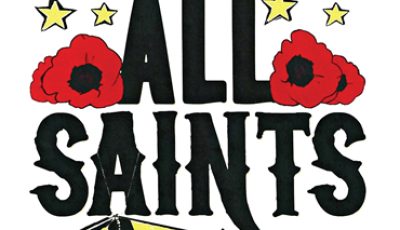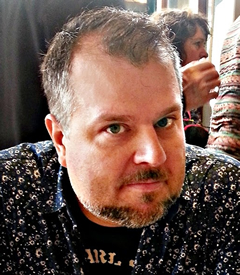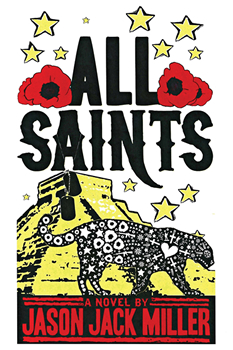

All Saints by Jason Jack Miller
Jason Jack Miller has had a varied and interesting career path. He’s worked as a record store clerk, a whitewater raft guide on some of Appalachia’s wildest rivers, and a concierge in one of Florida’s finest hotels. His writing career got its start when he co-authored an outdoor travel guide with his wife in 2006. Since then his work has appeared in newspapers, magazines, literary journals, online, as part of a travel guide app for mobile phones, and in the award-winning writing guide Many Genres, One Craft.
His life has exposed him to some interesting stories and points of view, and it appears that many of these end up in his fiction.
The Murder Ballads and Whiskey series comprises four books so far, including the just-released ALL SAINTS. It’s difficult to review a book that comes fourth in a series. Don’t get me wrong; you can read this as a standalone, but there are events that are deeply etched into the fabric of the larger canvas. It’s almost like looking at a corner of a picture without moving back a little and taking in the entire image.
In a nutshell, we’re introduced to an immortal woman and a man haunted by his past and suffering from PTSD. Ben joined the army after the horrific events of September 11th and found that the reality of war was more brutal and dehumanizing than anyone should have to bear.
The story begins with a chase at sea. Almost immediately we are thrown into what appears to be a drama that has played out for a much longer time than seems possible. Love, redemption, and mysticism take center stage as we are hurtled along on an unforgettable ride.
All Saint’s Day is a time when what is real and what is not, what is lost but may yet be reclaimed, are thrown together in a journey that transcends what we know and stumbles into a shadow of what was and what might be. Confused? Don’t worry, the book will lead you gently through the story, at least until it slaps you across the face.
Jason took some time out of his busy schedule to give us some insight into his work and process.
Can you tell us how your writing process works? Do you plan out every detail, or do you see where the story leads?
So far, each of my books came into the world just a little differently. I started the novel that would eventually become ALL SAINTS way back in 1998, when my wife and I were living in Florida. Hellbender came into being as I began my matriculation in Seton Hill University’s Writing Popular Fiction Program. Both began as a way for me to feel connected to the mountains and rivers in my little corner of Appalachia while I was living in the Sunshine State working for The Mouse.
The next two [books] were the most straightforward—intense, in-depth outlines followed by fairly painless first drafts and lots of revising. But it was while writing one of those books that I came upon a biography of Geoff Emerick, a studio audio engineer who worked with The Beatles from Revolver up through Abbey Road. He talked about how the band wanted each record to be unique and went into the studio with fresh ideas and techniques whenever it was time to start a new one. I tried to make that a part of my process—never wanting to repeat myself and finding ways to push into new territory with everything I write, whether it’s tweaking the form or a POV or the plot structure.
As this is part of a series, can you give us a grounding on what we need to know for this one?
As much as I tried to make it stand-alone, I realize that readers will be best served once they know Danicka has lived a long and interesting life due to some supernatural transactions she made as a young woman. Maybe it was a deal with the Devil. Maybe it was something else. Either way, facing the horrors of world wars and the emptiness that comes from watching loved ones get old and die while never aging a day has made her desperate for a way out.
Your work reflects a deep knowledge of mysticism and music. Can you give us an idea of how these elements have impacted your life?
I was the kid with the most plastic dinosaurs growing up. I had a fossil collection. My backpack was always stuffed with identification guides and a magnifying glass. Whenever I felt overwhelmed by some circumstance of a crappy situation at home, I disappeared into books about space or natural history. Science provided the answers to any question I could think of asking.
Until one day it couldn’t.
I found music at a time when things really started to fall apart. My guitar teacher and the other musicians became my new family. I could get lost in Metallica’s “Orion” or Pink Floyd’s “Dogs” in much the same way I got lost in the idea of a never-ending cosmos. At some point I suppose different answers to all those old questions began to filter in through my subconscious. Different ways of thinking and looking at the things that troubled me. I stopped looking up and started looking within. And once I stumbled into the Grateful Dead I learned about Kerouac and Ferlinghetti, which led me to Zen Buddhism and Tibetan Buddhism. As I got older, I found the spiritual nature of Buddhism grew less appealing—I wanted the philosophy more than anything else. Then I read Camus and became (mostly) content with no longer needing an answer.
And now I’m happy to put everything back into the pot just to see what happens. The science, the philosophy, the mysticism, the music. Writing lets me bring all of this together in a special way that appeals to me and makes me happy.
The long and painful road to redemption is a huge part of your work. You certainly don’t give your characters an easy ride. Are you so mean by nature?
I cringed the first time I heard someone describe one of my books as dark because I consider myself an optimistic person with a great sense of humor. And I’d always assumed that the eventual triumph of the human spirit would be enough to cleanse the palate of any reader after they’d put the book down, and now I know that I was wrong about that. Somewhere along the way I got the idea that we were meant to put our characters through the ringer. Push them right to the edge and just let them dangle for a bit. Maybe I do go too far because I’m just a little cynical. But in an era of terror and mass shootings, is the Devil really so scary anymore?
In between research and writing, do you have any time to read?
In the last three or four years I devoured Alan Furst’s entire bibliography of historical spy thrillers. History may as well be a fantasy since the world from that time no longer exists. Elements do, which is why we are drawn to castles or ruins. Or Paris. But once I discovered Furst’s novels I realized I had a brand new sandbox to play in. A familiar past with familiar rules to be manipulated however the author sees fit. And unlike Westoros [in Game of Thrones] or Arrakis [in Dune], I could actually visit these places and feel what [people] felt 50 or 500 years ago.
Once I finished Furst’s novels I stumbled into Philip Kerr and Robert Littell. Reading historicals made me curious about what people read and listened to during those periods, and my pop culture tastes got broader and deeper. My wife and I have even made recipes mentioned in these books, looked for the wines they drank. All in all, it’s a new genre for me, and so far, it’s been a lot of fun.
What’s next?
I’m working on my own version of a historical spy thriller, with a twist. The series will take place over a hundred years, and in each one the protagonist will seek assistance from supernatural sources. Did I mention that Danicka from ALL SAINTS would be in each of these? I see her as a James Bond sort of character—timeless, appearing anywhere at any time. The Liberation of Paris. The Fall of Berlin. The Prague Spring. It’s ambitious, but fun.
I got the idea when we were in Italy in 2016. Danicka is part of the Italian resistance and stages a horse race in Siena as a way to end the Nazi occupation there. Then it’s a race to Florence to save the Ponte Vecchio and other priceless works of art hidden throughout the city from the occupiers who’d destroy them all rather than let the Allies save the city.
My wife and I are also working on something together. It’s sort of The X-Files behind the Iron Curtain. We’ve had a lot of fun working on this and learned that we work together quite well.
*****
 Jason Jack Miller knows it’s silly to hold onto the Bohemian ideals of literature, music, and love above all else, but he doesn’t care.
Jason Jack Miller knows it’s silly to hold onto the Bohemian ideals of literature, music, and love above all else, but he doesn’t care.
His own adventures paddling wild mountain rivers and playing Pearl Jam covers for less-than-enthusiastic crowds inspired his Murder Ballads and Whiskey series. He wrote HELLBENDER as a student in Seton Hill University’s prestigious Writing Popular Fiction program, where he is now a mentor and adjunct instructor. The novel won the Arthur J. Rooney Award for Fiction, the MacLaughlin Scholarship, and was a finalist for the Appalachian Writers Association Book of the Year Award. ALL SAINTS is the fourth book in this linked series.
When Jason isn’t writing, he’s with his wife, Heidi Ruby Miller, either in Paris perusing the bouquinestes or in the Cinque Terre trying to taste ALL the focaccia. And for the rest of the year he plays the role of Mr. Miller, mild-mannered science teacher at Uniontown Area High School. Follow him on Twitter and Instagram @jasonjackmiller or email him at jasonjackmiller@gmail.com.
- Spotlight: M.P. Woodward - May 31, 2023
- All Saints by Jason Jack Miller - February 28, 2018
- The God Gene by F. Paul Wilson - December 31, 2017

